Two women convicted of animal cruelty offences in horrific ‘house of horrors’ puppy breeder bust in SA’s Mid-North
More than 110 animals have been seized and two women have been convicted over one of SA’s worst cases of animal hoarding. See the appalling video here.
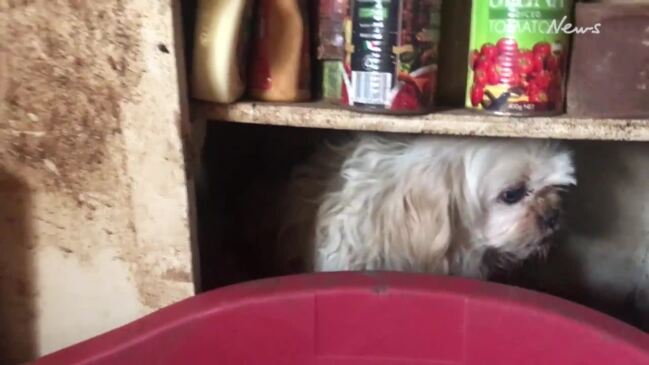
Police & Courts
Don't miss out on the headlines from Police & Courts. Followed categories will be added to My News.
Two women in their 60s have been convicted over what the RSPCA says is one of the worst cases of animal hoarding they’ve investigated.
More than 100 animals including 90 dogs were taken from the Mid-North property belonging to the banned puppy breeders, who lived in “squalor” with the pets inside what the RSPCA has called a “house of horrors”.
Two women, both aged in their sixties, were convicted in the Elizabeth Magistrates Court last week on animal cruelty offences in relation to 68 animals.
RSPCA SA inspectors uncovered 91 dogs and puppies, 11 cats and kittens, five native birds, three possums, and one bettong “living in squalor” with the defendants inside their home during the November 2020 raids.
“There was an overwhelming odour of rubbish, faeces and ammonia,” the RSPCA said.
“Encrusted and hardened dirt, faeces and hair covered all floors. Dirt extended up walls and over benchtops, and heavy cobwebs hung from the ceilings.
“The house in which the defendants lived with their animals did not have electricity connected to it.”
The seized dogs were various mixes of popular smaller breeds including maltese, miniature poodle, silky terrier, chihuahua, shih tzu, pomeranian, papillon and King Charles cavalier spaniel.
Three were euthanased while others required extensive veterinary treatment for “multiple” health issues.
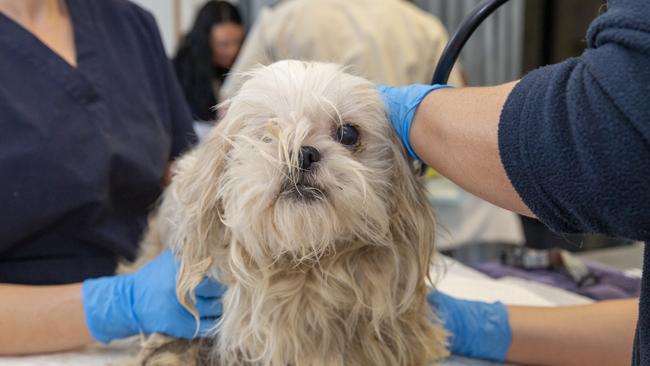
RSPCA SA Inspector Emma Shepley, the lead investigator in the case, said it was a “confronting sight” as she walked into the house.
“It was extremely confronting and quite overwhelming at first given the number of animals inside and the types of animals. It was also really sad,” she said.
Puppies, cats, and kittens were found in cages and crates “stacked on each other”, while some dogs were seen sitting in cupboards and on shelves.
The RSPCA discovered a small dog – named Muffin – under a table, unable to move alongside another dog – named Winky – who also appeared to have difficulties moving.
A joey kangaroo was found in a cloth bag, laying on top of a pet carrier containing a possum inside, while 11 kangaroos – one with a broken leg – were discovered in an enclosed rear patio room.
In a video released by the RSPCA taken at the scene of the investigation, inspectors can be heard engaging in conversation with one of the defendants.
“So you’re breeding these puppies? You said you didn’t have any puppies,” the inspector said.
“You didn’t ask me,” the defendant replied.
“That’s all right, we just need to do our job and we need to do it correctly,” another inspector said.
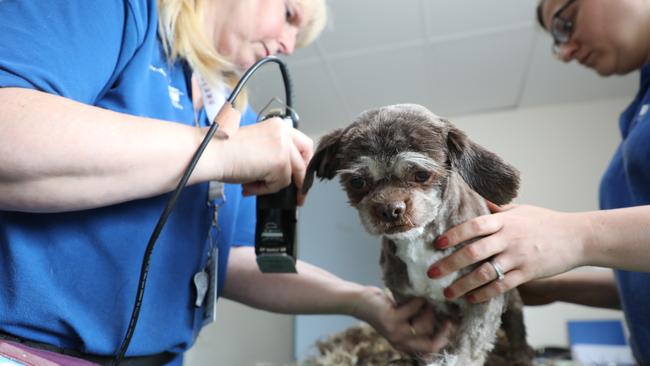
RSPCA SA chief inspector Andrew Baker described the case as “one of the most extreme examples” of animal hoarding the organisation has dealt with, and has pleaded with prospective puppy buyers to do thorough background checks.
“These defendants were registered breeders and had previously supplied puppies to pet shops,” Mr Baker said.
“Imagine how you would feel if you bought one of those puppies and later learnt of the conditions in which it had been bred and kept.”
The defendants were registered SA breeders up until June 30 last year and previously ran a commercial dog breeding operation.
“The case highlights not only the failure of SA’s breeder regulations to stop low-welfare operators but also the need for a legal reform that RSPCA SA hopes to see introduced,” the RSPCA said.
“If successful, the reform would end the requirement to successfully prosecute animal hoarders to obtain animal ownership prohibition orders.”
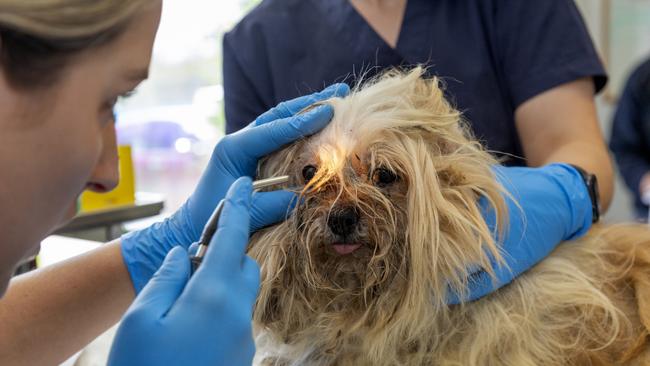
Ms Shepley echoed the RSPCA’s comments that this case highlighted the need for legal reform.
“We would love to see the laws change around everything but particularly these types of hoarding issues where we have to step in and remove animals from the property,” she said.
Over two days in early November, inspectors initially seized 80 of the most concerning animals, while three seriously ill animals – the bettong and two dogs – were taken to the Adelaide Emergency Centre where they were subsequently humanely euthanised.
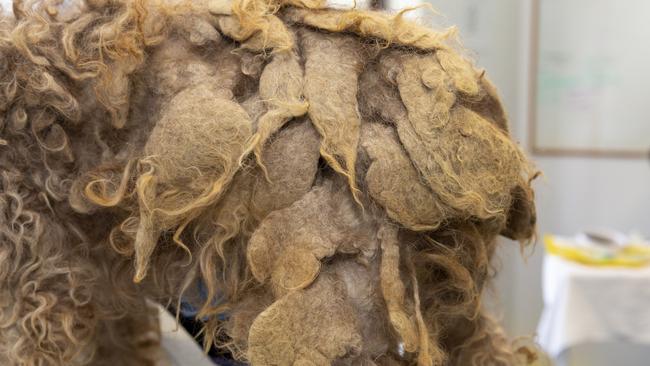
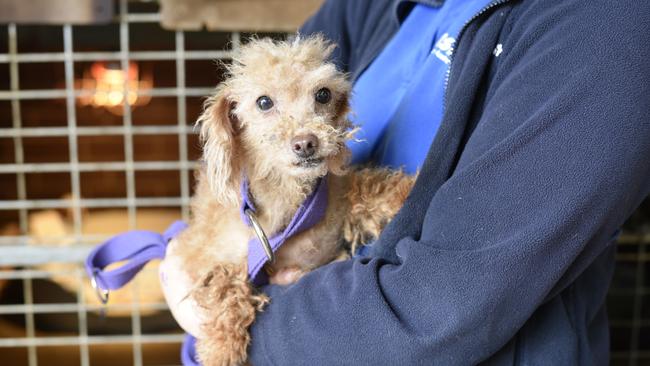
They returned about a week later with a warrant and police officers, finding native birds in aviaries, some with obvious health issues, squirrel gliders, a large number of rabbits roaming and in cages), a goat with a broken leg and another with an extremely swollen teat, a mule with a large distended stomach, a brushtail possum confined to a wooden box, 28 dogs, turtles housed in small tanks with no access to dry areas, and more turtles in bathtubs that ate ravenously when given food.
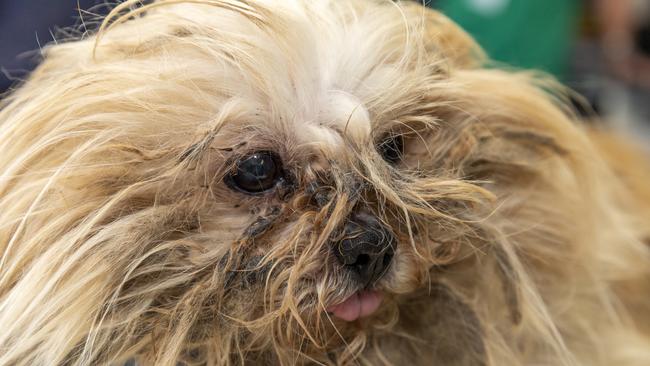
The large intake of animals placed enormous strain on the organisation, Mr Baker said.
“Of the 111 animals seized from this property, we rehomed 90 and transferred 16, mainly native animals and birds, to other rescue organisations,” he said.
“Given the fact that almost every animal required some degree of veterinary treatment, and in some cases significant treatment and rehabilitation, this was an incredible outcome for these animals after their rescue from this house of horrors.”
The woman pleaded guilty to 11 charges of animal ill-treatment, down from an original 69 charges.
RSPCA SA’s legal counsel, Simon Perrie, told the court the offences were so serious a jail term was required, but it ought to be suspended given the defendants’ ages and lack of criminal history.
Magistrate Edward Stratton-Smith imposed a six-month sentence, reduced to three months and 18 days due to the defendants’ guilty plea. The sentence was suspended on a two-year, $500 good behaviour bond.
The cost incurred by RSPCA SA in treating and caring for such a large number of animals was $46,000, but due to the defendants’ financial circumstances they were ordered to pay just $2000.
The two women have since been forbidden from owning any animals other than one companion animal each, which will remain in place until further order.
Ms Shepley was optimistic the sentencing would provide adequate justice.
“Everybody deserves an opportunity to be able to prove themselves, to be able to have an animal,” she said.
“The court order is set out as such that we can monitor these two ladies accordingly. We can inspect the property twice per year to ensure that the owners are complying with the court order.”





